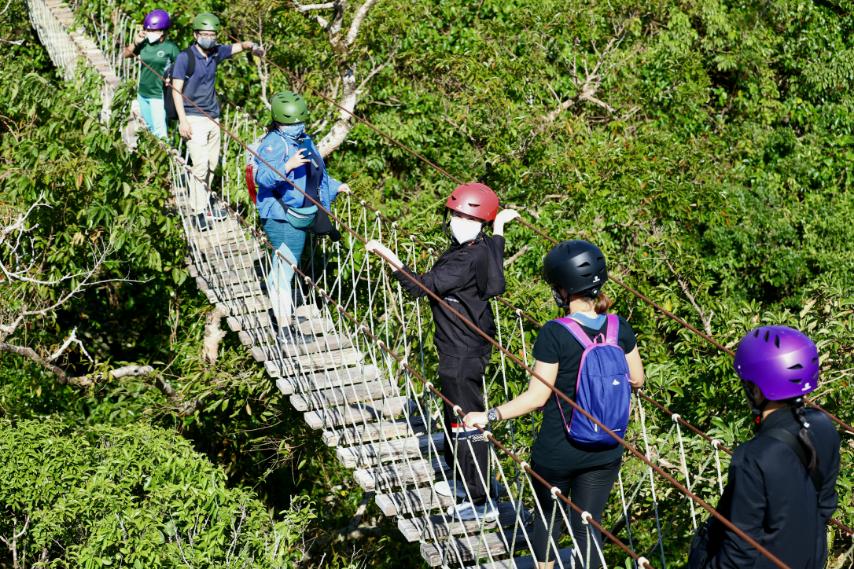Travel
Masungi Georeserve reopens to tourists

During the reopening, Masungi also launched its newest feature, the Legacy Trail for hikers who wants to immerse themselves into forest conservation activities. (Photo by Robert Alfiler via PNA)
MANILA – The Masungi Georeserve, a premier eco-tourism destination in Rizal province, formally reopened on Wednesday (November 25) after months of closure due to the coronavirus pandemic.
Guests are required to book their reservations at Masungi’s website, with the number per group limited to five to eight persons to observe minimum health protocols.
The entrance fee ranges from PHP1,500 to PHP1,800, with no testing required except if you are exhibiting symptoms while already at the site.
“Ang maganda dito sa Masungi it’s quite close to Metro Manila and alam naman natin ‘yong mga turista galing National Capital Region so this is close enough (What’s good here in Masungi is that it’s quite close to Metro Manila and we know that most of the tourists are from the NCR so this is close enough),” Tourism Secretary Bernadette Romulo-Puyat said during an interview with reporters in Baras town.
The destination is known for its sprawling limestone landscape and trails perched on towering trees.
During the reopening, Masungi also launched its newest feature, the Legacy Trail for hikers who wants to immerse themselves into forest conservation activities.
Both the Legacy and Discovery trails are a circuit to prevent close contact among tourists.
The Masungi Georeserve Foundation also allotted pre-designated, spaced-out areas at the end of the trail to allow a safe dining experience for guests. All areas are outdoors or open-air spaces.
How to get there:
Cruise through Marcos Highway. You will pass through Masinag, Cogeo, Boso-Boso Resort, Foremost Farms, and Palo Alto. Masungi Georeserve is at Kilometer 47 of Marcos Highway, Baras, Rizal.
‘More than tourism’
More than tourism revenues, Ben Dumaliang, Masungi’s trustee, is hopeful the reopening would drum up support among visitors to protect the 2,700 hectares of vulnerable land, often targeted as a site for quarry and illegal logging.
“Ang mas malaking tulong niya actually is the visibility sa tao. Marami kasing nagco-covet sa lugar (It’s really helpful as tourism makes the area visible to the public. There are many out there coveting this land), they want a hacienda, they want to quarry the place, they want to do businesses here, ‘pag nakita nilang pina-patronize ng tao ‘yong lugar, medyo natatakot ‘yong mga may interes, natuturn-off din sila kasi siyempre ‘yong gagawin nila (it’s good that we have tourists patronizing the area so that those with interests would at least fear exposure),” he said in an interview.
“Mas importante sa amin is makita, to raise awareness kasi ‘yon ang defense namin against all these illegal interest (We want to make this place visible to the public, to raise awareness because this is our defense against all these illegal interest),” he added.
With almost eight months of zero tourism activity, the foundation had to spend around PHP2 million a month from its resources to maintain the conservation efforts and sustain its almost 100 workers and park rangers.
“Noong eight months na wala kaming income, sarili naming funds ‘yong aming ginagamit to maintain about 100 people. Per month ang nalalabas is one to two million, sarili naming resources (For eight months that we don’t have an income, we’ve been using our own fund to maintain our 100 workers. Per month, we shell out around PHP1 million to PHP2 million from our own resources),” Dumaliang said.
Ann Dumaliang, Masungi’s project manager and Ben’s daughter, said this sacrifice had to be made because suspending the area’s conservation efforts is not an option.
“We need to continue it because Masungi’s core activity is really conservation, you can’t not be here at a time when environmental opportunism is at its peak. If we killed the conservation work alongside the tourism decline, the damages would definitely be irreversible,” she said in a separate interview.
“Sakripisyo talaga siya (It’s a sacrifice) because it’s what we’re here for. Tourism is a revenue stream to support our operations but we can’t afford to lose the people, we can’t afford to lose the environmental protection efforts,” she added.
For eight months since the pandemic lockdowns, Masungi Georeserve did not layoff any of its local employees, most of whom are from the Dumagat tribe.





















